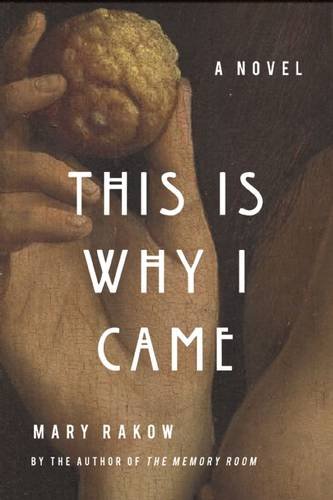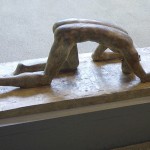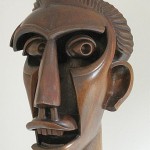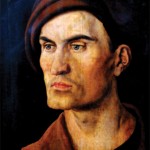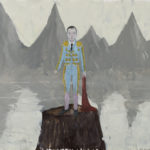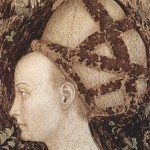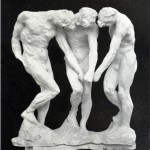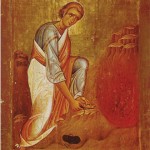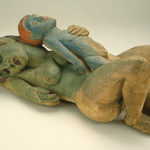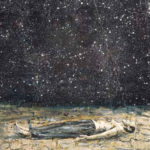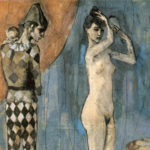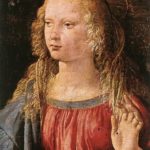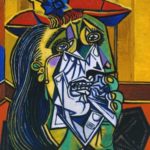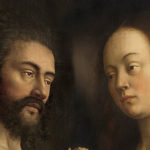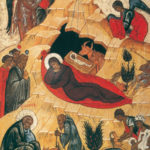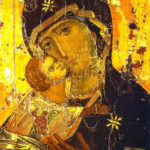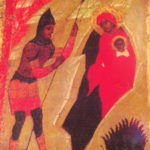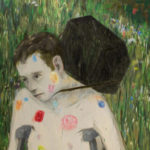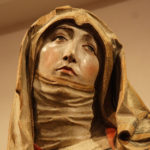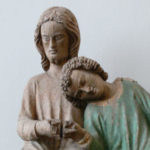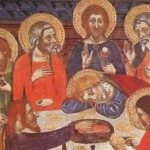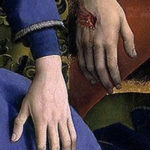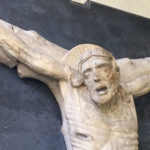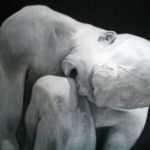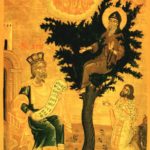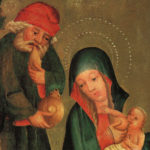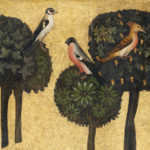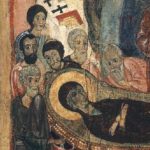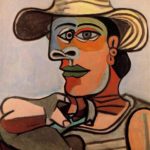God spoke to Jonah, the son of Amittai, saying, “Arise, go to Nineveh, that great city, and cry against it, for their wickedness has come up before me.” But Jonah did not rise up and instead lay in his bed dreading another city. He knew what God wanted him to say. Tell them their city will be overthrown in forty days. He had done it before many times. Over and over God had sent him to cities, starting with the small ones, villages at first, then larger. And over and over Jonah did as God had asked. He’d frightened them then waited to see if they would repent.
It was different in the beginning when God let him preach repentance, too, and that he didn’t mind. He could say, “Your city will be destroyed unless you repent.” And some of them did repent, and Jonah felt good about his job then, saving the inhabitants and bringing about a reconciliation with God and the people. It was gratifying and they loved Jonah for warning them, and esteemed him as a prophet. He had built his reputation that way, almost a savior.
But lately God was asking him to preach destruction only so that Jonah felt used by God, that he was part of God’s testing people to see if, on their own, they would think of repenting. So that he dreaded God’s voice and dreaded going to work, dreaded packing his bags and saying good-bye. His wife didn’t know what to say to console him because he was a good man, a holy man, but, increasingly, an angry man, too.
Either the inhabitants of the city would realize repentance was necessary, and be saved, or they would not, and it was painful for Jonah to see all the deaths of those who did not think to repent. God testing greater and greater populations, so that now God had set his heart on Nineveh, to test that metropolis, the greatest city Jonah had ever seen.
It also seemed to him that God loved repenting of his anger. First feeling it then changing his mind and repenting of it. He seemed dependent on it and this need in God had troubled Jonah for some time. Jonah came to feel separate from his own conscience, allowed to say, “Your end is coming!” but not to make clear the only remedy. It seemed a trick, finally, to Jonah and he felt defiled by it. As if he was being dragged around by God and his ever-increasing need to be loved.
Jonah had also grown hardened by all the deaths he had witnessed. It sat heavy on him at first, but then he grew indifferent, immoveable, his heart so cold that he could see suffering and feel nothing, see his own child fall and feel nothing, see his wife mourning the death of her mother and feel nothing, the widower next door who often had no bread, no oil for his lamp, and feel nothing. It was Jonah’s safety and this frightened his wife who missed the man she had married. They had vowed to love each other until death, and Jonah seemed dead to her already and he felt dead.
When God asked him to go to Nineveh, Jonah fled in the opposite direction, defying God, but feeling wonderful as he ran. He boarded a ship to Tarshish and paid the fare and went down into its hold and slept better than he had in many years.
But God caused a great wind to whip the sea, a tempest so great that the ship would be broken by it and the mariners were afraid and while Jonah slept peacefully each cried out to his own god for deliverance. Seeing no result and desperate, they frantically cast their wares into the sea to lighten the ship’s load. But the wind did not diminish and then they feared for their lives.
Indignant and furious, the captain of the ship came down to Jonah and asked, “What are you doing?” He commanded Jonah to call out to his god like they each had so that the crew and the ship would not perish. “What is your name?” he asked. “And your occupation? Where are you from and why are you here with us?”
Jonah saw terror on the face of the captain but felt nothing. He learned that the sailors had cast all their wares into the sea and felt nothing for them either. Calmly he told the captain that he was a Hebrew, that his god had made the heaven and the earth, the sea and the dry land, and with candor said he was fleeing the presence of his god at that very moment. Finding his life a trifle, Jonah said, “Cast me into the sea. The wind will die down then, immediately.” Without remorse, he added, “I am the cause of all of this.” And he prepared for his death, looking forward to it, to the integrity of that final act.
But the captain and crew didn’t want to cause the death of a man who seemed otherwise innocent, so they rowed hard to bring the ship to land and could not. Only then did they beseech their gods to not hold Jonah’s innocent blood against them, and took Jonah up and cast him into the sea. And the sea became still.
Jonah fell to the depths, to the bottoms of the mountains there, seaweed wrapped his hair but he did not die as he had hoped. Instead God had prepared a great fish to swallow Jonah and it did, and Jonah was in the belly of the fish three days and three nights.
I can stay here for the rest of my life and be content, Jonah told himself, in that basilica of bones, the thunderous heartbeat in the thick fleshy red walls, the constant passing of water in and out, up to his shoulders in it, the whale’s long, lonely cries that went on hour after hour. Because he had not preached to Nineveh what God had commanded, Jonah felt peace.
But on the third day he woke to the sound of thrashing, the wet floor of muscle, the grid of bone wildly rocking, the upward pull so that he could barely keep his balance, then the bright sun, his arms outstretched, flying through the air, the cold wind, the waves beneath him until he fell to the sand. And Jonah remembered that his power was not the same as God’s power. And that he didn’t even have power over his own life, and in despair he resigned himself to this.
He knew what God would want to hear, the sweetness God longed for. So he said the words as he lay on the sand, sore and bruised. He said them by rote, without conviction, “I cried because of my affliction to you, Lord, and you heard me. Out of the belly of Hell I cried, and you heard my voice.” Then he lied to please God further, saying, “You cast me into the deep,” which was not true because Jonah had asked to be thrown overboard. But God did not correct him and this troubled Jonah. He continued, “The floods compassed me about, and I said, ‘I am cast out of thy sight.’ Yet, I will look again toward your holy temple. When my soul fainted I remembered the Lord and my prayer came in unto thee,” which also was not true because he had not prayed to God at all. Then to finish he said, “Salvation belongs to you,” which he knew God longed to hear. And God received Jonah’s words with joy, which saddened him even more, that God could no longer discern the matters of his heart.
But then Jonah said something that he did believe. He called after God, yelling it as an insult, but also because it was true. Yelling to bring candor back, as it had marked their times together in the early years. “They that observe lying vanities,” he screamed, “forsake their own mercy!” But God kept walking away.
Jonah returned home to the sullenness of his wife, to the distance of his daughter, to the meaninglessness of his life, and spoke nothing about his journey or his time in the whale or that he finally accused God of his vanity. That mercy paid the price.
Then the word of God came to Jonah a second time regarding Nineveh. “Arise,” Jonah heard in the night. And he felt sickened by the voice that would not leave him alone. He dreaded what he knew would follow, and it did follow. God’s vanity not satisfied, Nineveh still tempting him. “Go to Nineveh,” God said, again, “that great city.” Jonah heard the sighing of God as a kind of lust. “And preach to it the preaching I bid you.” Jonah felt the noose tightening.
He looked again at his wife and child, knowing he was powerless against such a god and he packed his bags.
It was an exceedingly great city and after walking one day toward its center Jonah began to preach. “In forty days Nineveh will be overthrown.” He didn’t speak loudly or with zeal. He couldn’t rouse himself even though thousands would perish. When he finished preaching he went outside the city and there built himself a small booth and sat under it in the shadow, waiting to see what would happen. Either God would destroy the vast and beautiful city of Nineveh, or, by some miracle, they would come to repentance and the city would be spared. If spared he would be called a false prophet, one whose words were not true.
To his surprise, the people of Nineveh proclaimed a fast and put on sackcloth, every man, woman, and child. And when his words reached the king, the king himself rose from his throne, laid aside his robe and covered himself with sackcloth. He sat in ashes and promulgated a decree saying, “Let neither man nor beast, herd nor flock, taste anything. Let them not feed or drink water. But let man and beast be covered with sackcloth and cry mightily unto God, turning from their evil ways and from the violence in their hands.” This astonished Jonah. Beasts in sackcloth and ashes, cows fasting, chickens and pigs. “Who can tell if God will turn away from his fierce anger so that we not perish?” the king ventured.
With those last words Jonah knew that God had the best of what he desired. The rest was predictable. God saw their repentance and repented himself of the evil he had said he would do to them. And he did not destroy the great city of Nineveh.
Jonah raged against God, who was, at that time, so pleased. “Take my life from me!” he implored, but God would have none of it.
“Is it good for you to be so angry?” he asked Jonah almost coyly, and Jonah hated God then, his neediness, his vanity, his predictability and lust.
It was day, the sun hot on Jonah despite his booth, and God caused a gourd to grow up over Jonah to increase the shade, saying, “This will deliver you from your grief,” and hearing this Jonah felt even further from the God he once loved.
The gourd and the vine cooled Jonah and Jonah felt for the gourd all the love he’d once felt for his wife and daughter and for God himself, the gourd bringing all this to Jonah so that he loved the gourd deeply and cried because he could again feel such things.
But in the morning he saw that a worm had killed the gourd and that the vine had withered and Jonah sensed that God was behind this, that he had brought the worm. And Jonah broke down and wept bitterly for the helpless gourd. He wept for all the people in cities and villages who had perished because his words weren’t enough to direct them to repentance. He cried for his wife and child whom he no longer knew. He cried for the mariners and the possessions they’d thrown overboard on his account, and for the whale who had generously housed him. He cried for all the people every day of his life for whom he felt nothing. And he cried because the repentance of Nineveh was so complete, even the cows and sheep and horses cloaked in sackcloth. He’d never seen such a beautiful show of contrition, the gourd so helpless, the leaves of the vine crushing in his hand.
He wanted to bury it properly but a vehement east wind came and the sun beat on his head so that he fainted and he thought, maybe this time I won’t wake. But God woke him and said, “Is it good that you have pity on the gourd?”
And Jonah gathered all his strength and screamed, “Yes! It is good that I can weep and be angry and that I have pity on the gourd!”
“Well,” God sighed, “don’t you think I should have spared Nineveh, that great city, with more than six-score inhabitants who can’t discern between their right hand and their left, and much cattle?” At this Jonah fell even deeper into despair, which he thought was impossible, disgusted to hear God again refer to the greatness of Nineveh, to the size of its population, even the cattle, because they too had given him what he craved.
Jonah sat up then stood and cried out, “I am done with you! I am sick of this! I’ve become a jester. A harlequin, don’t you see? I want an ordinary life. To be like the mariners. I want my wife and daughter. I want to go home!”
And with that God let him go.
Casting about, knowing he must find a replacement, for his need was great, God wondered where he would find a prophet as powerful as Jonah.
When he returned to his wife and child, Jonah took off his diamond suit and threw it into the trash. He and his wife began to speak to each other again about important things. When Jonah told her about God’s limitless hunger she asked, “What did you say?”
“I am no longer your prophet. I want to go home.” And she loved him robustly because he was a man of integrity again. “I couldn’t believe in him anymore,” Jonah said, taking her hand as they sat on the edge of the bed. “If you’re no longer his prophet,” she asked, “what will you be?”
They sat, leg against leg, rubbing each other’s fingers, getting re-acquainted. Admitting the term was new for them, and that it had an unusual sound to it, he told her, “I will be God’s atheist.”
They sat a long time and Jonah felt clean and refreshed. He felt, at last, home.
When they stood at the door and looked at their daughter who was sleeping in her bed, Jonah saw that the story of his life would be told in a different way than he had lived it, if it was told at all. It would become the story of a prophet who rebelled against God then repented. There would be nothing of his sense of debasement or the coldness of his heart that the job came to require. Others would not see, as God had not seen, why he wept so bitterly at the death of the gourd. He likely would never be understood by anyone except by his wife, for which he was grateful, and he thought such not-understanding was perhaps the human condition in general. And this pleased him, to be like others, to be part of what was experienced by well-meaning people of all kinds, rather than preaching against them.
As his wife bathed him and washed his hair, he saw a future in which icons would be painted showing him coming out of the mouth of a great fish. He would be painted standing upright with a scroll in his hand and the words on the scroll would be the words he’d said to God halfheartedly, by rote. There was nothing he could do to prevent this. But he wished those who would devoutly paint him would give him truer words, more his own, so that the scroll would read, simply, “I wanted a better God.”
Harlequin’s family – Pablo Picasso by WikiArt.org is in the public domain.

